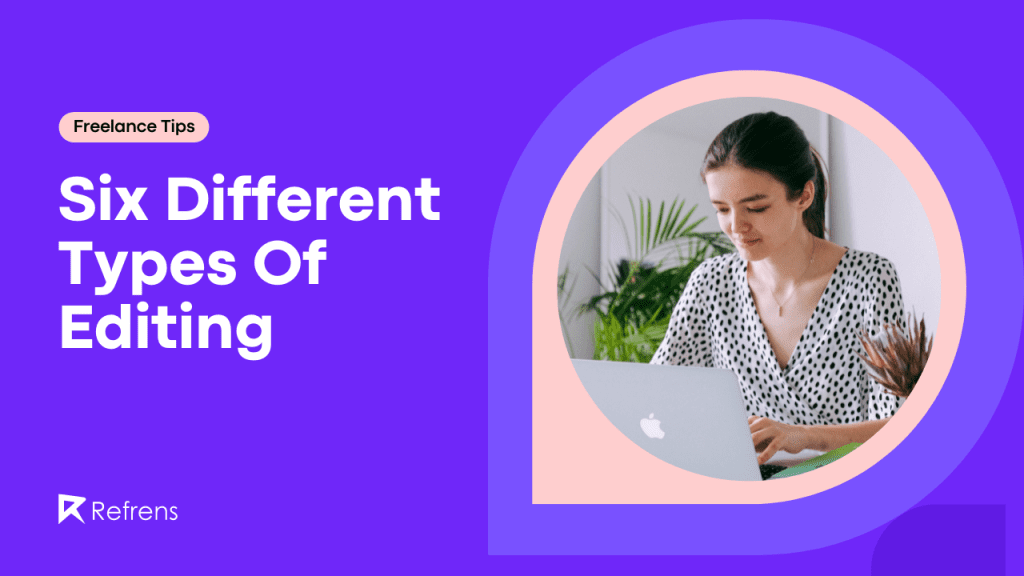Do you have a knack for spotting grammatical errors and typos in articles? Would you perfect someone else’s work rather than start something from scratch? In this piece, we’ll tell you all about the types of editing.
We’re sure many of you know some of the basic types, such as proofreading, but there are more kinds than you might think.
While there are overlaps within these, every type is different. Each one focuses on another aspect of the overall editing process. Many editors prefer to perfect one style, although a lot of us dabble in multiple areas.
Here’s the list:
Development Editor
A developmental editor collaborates with authors to help them create a book from beginning to end, including subject and character development, story design, and dialogue. If you have experience authoring novels and building plot arcs, structure, and flow, you may be able to offer this form of editing.
Developmental editors don’t write or rewrite anything. They may give comments, but their goal is to help you improve as a writer by demonstrating how to arrange your thoughts, structure your book’s substance, and quickly transition between concepts.
They’ll help you see your book through your readers’ eyes and provide criticism to assist you in writing a book that people will love reading.
You may not need to engage a developmental freelance editor if you’re a seasoned author or if you’re confident in the book you’ve written. However, developmental editing can be beneficial if you need assistance transforming your thoughts into a book.
Copy Editing
Copy editing ensures style consistency by checking for errors in language, sentence structure, punctuation, and spelling. It also requires digging up references to ensure that the information and figures are accurate and trustworthy.
Copy editing goes before proofreading since it is more involved, checking for the cohesiveness of the writing. It also refers to revisiting whether the context of the words makes sense and is relevant.
Want to become a copywriting superstar? Check out our blog for some insider tips and tricks to kickstart your journey!
Proofreading
Proofreading is the final polish before the copy is sent to the printer. Proofreaders look for typos, grammatical, spelling, and punctuation errors, and consistency in design elements, including page numbers and line breaks. This usually happens at the end of the editing process as a final walk-through to make sure there are no errors before it is sent ahead.
Furthermore, there is usually confusion concerning the differences between copyediting and proofreading.
Here’s a simple way to remember the difference if you want to break it down:
Copyeditors catch all of the errors that the author overlooked.
Proofreaders catch all of the errors that the copy editor overlooked.
Line Editing
Stylistic or line editing is a style used in both fiction and nonfiction writings. Line editors work to improve the writer’s voice and tone by clarifying the writer’s message, polishing dialogues and descriptions, and ensuring that the material’s reading level is appropriate for the intended audience.
The line editor dives right in with both feet, offering the most thorough edit possible. They’re concentrating on word choice and whether or not each statement has the desired impact. The flow of your text is vital to line editors, but with how one word in a sentence interacts with the others. As well as the way sentences flow into each other.
Line editors flag run-on sentences, sentence fragments, and clichés. They assist you in clarifying meaning, removing jargon, and ensuring that each sentence sounds natural to the reader.
Structural Editing
Structural editing is a professional editor, who does an evaluation edit on your manuscript to examine its structure, flow, completeness, and general quality. The editor will generally send you a brief letter outlining their main points, areas of concern, and recommendations for your work.
They’ll also make extensive notes on your book, noting any structural difficulties or questions they have. They’re similar to a developmental editor in that they’re not as concerned with the finer points of your work as they are with any more significant difficulties.
What Kind Of Editing Does Your Piece Need?
After going over the various editing forms, you should understand which ones are right for your piece based on your needs as an author.
You should hire a professional copyeditor and proofreader at the absolute least to ensure that readers can appreciate the piece you worked so hard on without being distracted by dozens of errors.
What Skills Are Required By A Freelance Editor?
Now that you’re familiar with the many sorts of editing, let’s look at the job and business skills you’ll need to succeed at your position.
You might also wish to look into the basic skills required of a freelancer.
Where To Find Work Editing Work?
If you know what you want to do early enough, you can gain experience working on the school or student newspaper or volunteering with a charity.
Start as an editor’s assistant and work your way up, you may eventually venture out on your own as a freelancer once you’ve gained enough experience.
With so many different editing jobs available, you’ll need to decide which ones appeal to you. A fashion editor for a magazine, for example, will require other skills and knowledge than a science fiction book editor.
While this last piece from our blog discusses how to become a freelance editor, we recommend that you read it and get started. You’ll need a portfolio website, work samples to offer prospective clients, and testimonials from happy customers.
Moreover, there are plenty of freelance marketplaces where you can find work. You might start with freelancing job sites like Refrens and browse jobs there.
Also, begin looking for firms that might need your services — marketing agencies, publishers, publications, and even corporations – and start pitching them your services via email or phone if you’re adventurous!


















